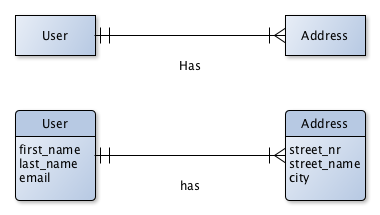Why Object Types are useful in Hydrators and Extractors
There are many implementations of Hydrator and Extractor pattern. What is Hydration?
Hydration is the act of populating an object from a set of data.
Hydrators have wide usage in ORM and Data Mappers their responsibility is to provide entity objects from relational database. Hydrators allow objects to be filled with data from an array. Extractors do the opposite, they take an object and return an array of data.

User Address ER diagram
General Hydration is described very well in Zend/Std/Hydrator package which can be imported easily with Composer by:
composer require zendframework/zend-hydrator:^3.0
Hydration example
According to library implementation basic hydration has one method
defined in HydrationInterface:
/**
* Zend Framework (http://framework.zend.com/)
*
* @link http://github.com/zendframework/zf2 for the canonical source repository
* @copyright Copyright (c) 2005-2015 Zend Technologies USA Inc. (http://www.zend.com)
* @license http://framework.zend.com/license/new-bsd New BSD License
*/
namespace Zend\Hydrator;
interface HydrationInterface
{
/**
* Hydrate $object with the provided $data.
*
* @param array $data
* @param object $object
* @return object
*/
public function hydrate(array $data, $object);
}
As we can see method hydrate() declares two params array $data and
$object which is used each time hydrator packs data from array into
object.
Extraction
Analog situation exists in ExtractionInterface:
/**
* Zend Framework (http://framework.zend.com/)
*
* @link http://github.com/zendframework/zf2 for the canonical source repository
* @copyright Copyright (c) 2005-2015 Zend Technologies USA Inc. (http://www.zend.com)
* @license http://framework.zend.com/license/new-bsd New BSD License
*/
namespace Zend\Hydrator;
interface ExtractionInterface
{
/**
* Extract values from an object
*
* @param object $object
* @return array
*/
public function extract($object);
}
As we can see method extract() declares one param $object which
is used each time hydrator extracts data from object into array.
What about Object Types?
Currently in PHP version 7.1 doesn’t support object type hinting and
return type declarations.
According to doc-block annotations valid input is object same as
return type in case of hydrate() method and object type hint declaration
in case of extract() method.
Providing object types as they’re described in my RFC:Object-typehint could increase readability and provide runtime type checks in examined situations. Thats because in described use case it is common to handle arbitrary object types.
Having an object return type would allow some errors to be detected more
quickly.
The following function is meant to return an object.
With the object return typ set for the function, failing to return an
object would cause a TypeError to be thrown in the location where the
bug is.
The extraction step can take an arbitrary object as the sole parameter.
The hydration step can take an arbitrary object as the second parameter,
and will return an arbitrary object.
Having the type for the parameters and the return type be set as object
will make the expected types be clearer to anyone using these functions,
as well as detect incorrect types if there is an error in the code.
Usecase improvement
Simple object type hint and return declaration can be provided in described interfaces like that:
interface HydrationInterface {
/**
* Hydrate an object by populating data
* @param array $data Data to populate
* @param object $object Object to populate data
* @return object
*/
public function hydrate(array $data, object $object) : object;
}
interface ExtractionInterface {
/**
* Extract values from an object
* @param object $object Object to extract data from
* @return array
*/
public function extract(object $object) : array;
}
class Hydrator implements HydrationInterface, ExtractionInterface {
/**
* {@inheritdoc}
*/
public function hydrate(array $data, object $object) : object {
// hydration implementation without need for `is_object` validation
}
/**
* {@inheritdoc}
*/
public function extract(object $object) : array {
// extraction validation without need for `is_object` validation
}
}